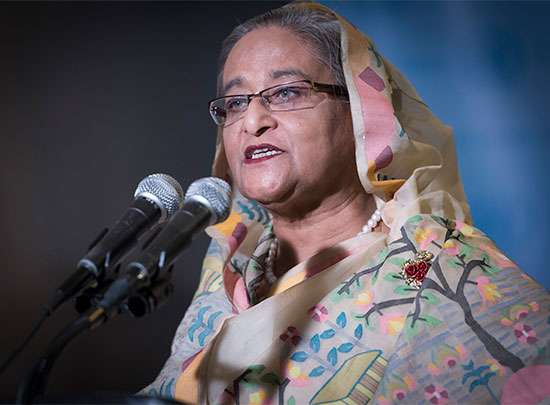Sheikh Hasina Wazed, byname Sheikh Hasina, Wazed also spelled Wajed, (born September 28, 1947, Tungipara, East Pakistan [now in Bangladesh]), Bengali politician and leader of the Awami League political party, who twice served as prime minister of Bangladesh (1996–2001; 2009– ).
Early life
Hasina was the daughter of Sheikh Mujibur Rahman, the principal orchestrator of Bangladesh’s separation from Pakistan in 1971. In 1968 she married M.A. Wazed Miah, an eminent Bengali scientist. While at the University of Dhaka in the late 1960s, she was active in politics and served as her father’s political liaison during his imprisonment by the Pakistani government. Hasina and other members of her family also were detained, briefly in 1971 for their participation in an uprising during the war of liberation that ultimately led to Bangladesh’s independence.
On August 15, 1975, Hasina’s father (who had just a few months earlier become president of Bangladesh), mother, and three brothers were assassinated in their home by several military officers. Hasina, who was out of the country when the killings occurred, subsequently spent six years in exile. During that time she was elected to the leadership of the Awami League, which had been founded by her father and had since become the largest political organization in Bangladesh.
Rise in politics
On her return home in 1981, Hasina became a prominent and outspoken advocate of democracy, which resulted in her placement under house arrest on numerous occasions. She ultimately secured a seat as leader of the opposition in the parliament, where she condemned the violence of military rule and initiated measures to secure basic human rights for all citizens. In December 1990 the last military leader of Bangladesh, Lieut. Gen. Hussain Mohammad Ershad, resigned in response to an ultimatum issued by Hasina and broadly supported by the people of Bangladesh.
Alternating leadership
In 1991—in the first free general election to be held in Bangladesh in 16 years—Hasina failed to obtain a majority in the parliament, and governing power passed to her opponent Khaleda Zia, leader of the rival Bangladesh Nationalist Party (BNP). Hasina and her followers accused the BNP of dishonesty during the election, and the Awami League, along with other opposition parties, boycotted the parliament. This act of defiant nonparticipation sparked violent demonstrations and plunged the country into a state of political turmoil. Although the BNP government denied all allegations of vote fraud, Khaleda succumbed to demands that she relinquish her office to a nonparty caretaker government that would oversee a new election. Hasina was elected prime minister in June 1996.
Although the economy of Bangladesh grew steadily during Hasina’s first tenure as prime minister, the country remained in political disarray. The BNP organized rallies and strikes, which often turned violent, while boycotts of parliamentary proceedings severely undermined the functionality of the government. Despite such adversity, Hasina remained in office, and in 2001 she became the first prime minister since independence to complete a full five-year term. The ensuing election was marred by further unrest, as Khaleda led an opposition alliance that solidly defeated Hasina. Once again Hasina and the Awami League protested the outcome of the election, claiming that the results had been fixed. This time, however, their protests were futile.
Following Khaleda’s return to power, Hasina continued her work with the Awami League in what remained a highly volatile political atmosphere. In 2004 she sustained minor injuries during a grenade attack at a political rally. In 2007—after a military-backed interim government had declared a state of emergency and canceled parliamentary elections—Hasina was arrested on charges of extortion, alleged to have taken place during her tenure as prime minister. Similarly, Khaleda was arrested on charges of corruption. Both were imprisoned. Hasina was released from jail in June 2008 and Khaleda in September. Later that year the state of emergency was lifted, and general elections were held on December 29. Running opposite Khaleda and the BNP, Hasina and the Awami League swept a solid majority into the parliament.
One-party rule
Hasina was sworn in as prime minister in January 2009. Four months later her husband died after a long illness. In January 2010 five former military officers who had been convicted of assassinating Hasina’s father in 1975 were executed in Dhaka, some 13 years after their trials had started during Hasina’s first term as prime minister. Later that year the government set up the first tribunal to begin trying war crimes cases stemming from the 1971 war of independence. Many of the tribunal’s convicts were influential members of the Awami League’s opposition, however, and supporters and allies protested the tribunal as politically motivated.

In 2017, in the midst of Hasina’s premiership, more than 700,000 Rohingya arrived in Bangladesh, fleeing genocide in neighbouring Myanmar. The government provided refuge and assistance, though it did not grant refugee status and worked to repatriate the Rohingya on a voluntary basis. The government received praise both internationally and domestically for helping the Rohingya, but concerns grew about finding a permanent solution to the crisis.
Meanwhile, Hasina and her party faced accusations of suppressing the opposition throughout their term in power. Many opposition members were arrested or tried, and the government at times seemed to stifle dissent and free speech. Jamaat-e-Islami, a small Islamist party key to the opposition coalition, was in 2013 banned from participating in elections, after a court ruled that its religious charter was inconsistent with Bangladesh’s secular constitution. Citing concerns that the 2014 parliamentary elections would not be free and fair, the BNP and other opposition groups boycotted the polls, and the Awami League swept the elections. Those concerns remained in place in advance of the 2018 polling, though the BNP did decide to contest the elections that year. Khaleda, still leader of the BNP, was jailed on charges of embezzlement and graft earlier that year and was not allowed to participate.









